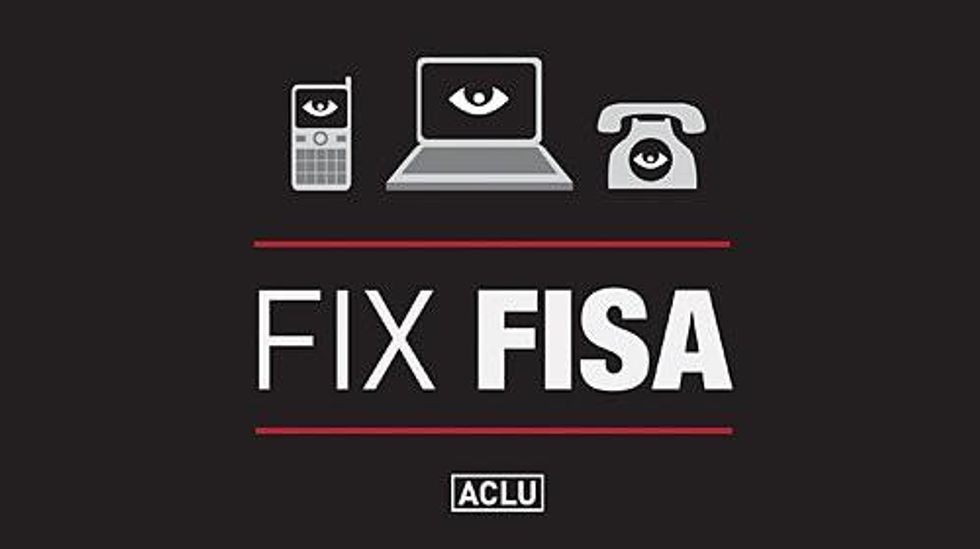House Reauthorizes Warrantless Wiretapping Program
On Wednesday, the House of Representatives passed a reauthorization of the 2008 FISA Amendments Act, an unconstitutional domestic spying law that gives vast, unchecked surveillance authority to the government. The law, passed in July of 2008, authorizes the National Security Agency to conduct dragnet surveillance of Americans' international emails and phone calls.

The Senate is expected to take up the law's reauthorization later this year. Sen. Ron Wyden (D-Ore.) has put a hold on the bill citing privacy and transparency concerns. Act now to tell the Senate that you're counting on them to uphold the Constitution, and fix FISA!
In a statement we issued after the House vote, ACLU legislative counsel Michelle Richardson commented:
"Yet again, the House has rubberstamped a law so broad and vague that, despite its passage four years ago, we still have little idea how the government is using it. It is at the very heart of the Fourth Amendment that Americans and their communications are fiercely protected from government intrusion. This law should be amended to include much stronger privacy protections when the Senate takes it up later this year."
Later this fall, on October 29, the Supreme Court will hear the ACLU's challenge to the constitutionality of the law. The plaintiffs include human rights, media and legal organizations. The government claims that the plaintiffs should not be able to sue without first showing that their own communications have been or will be monitored under the statute - information that the government refuses to provide.
Stay tuned.
Get Involved: Act Now
Tell your members of Congress: Fix FISA
An Urgent Message From Our Co-Founder
Dear Common Dreams reader, The U.S. is on a fast track to authoritarianism like nothing I've ever seen. Meanwhile, corporate news outlets are utterly capitulating to Trump, twisting their coverage to avoid drawing his ire while lining up to stuff cash in his pockets. That's why I believe that Common Dreams is doing the best and most consequential reporting that we've ever done. Our small but mighty team is a progressive reporting powerhouse, covering the news every day that the corporate media never will. Our mission has always been simple: To inform. To inspire. And to ignite change for the common good. Now here's the key piece that I want all our readers to understand: None of this would be possible without your financial support. That's not just some fundraising cliche. It's the absolute and literal truth. We don't accept corporate advertising and never will. We don't have a paywall because we don't think people should be blocked from critical news based on their ability to pay. Everything we do is funded by the donations of readers like you. Will you donate now to help power the nonprofit, independent reporting of Common Dreams? Thank you for being a vital member of our community. Together, we can keep independent journalism alive when it’s needed most. - Craig Brown, Co-founder |
On Wednesday, the House of Representatives passed a reauthorization of the 2008 FISA Amendments Act, an unconstitutional domestic spying law that gives vast, unchecked surveillance authority to the government. The law, passed in July of 2008, authorizes the National Security Agency to conduct dragnet surveillance of Americans' international emails and phone calls.

The Senate is expected to take up the law's reauthorization later this year. Sen. Ron Wyden (D-Ore.) has put a hold on the bill citing privacy and transparency concerns. Act now to tell the Senate that you're counting on them to uphold the Constitution, and fix FISA!
In a statement we issued after the House vote, ACLU legislative counsel Michelle Richardson commented:
"Yet again, the House has rubberstamped a law so broad and vague that, despite its passage four years ago, we still have little idea how the government is using it. It is at the very heart of the Fourth Amendment that Americans and their communications are fiercely protected from government intrusion. This law should be amended to include much stronger privacy protections when the Senate takes it up later this year."
Later this fall, on October 29, the Supreme Court will hear the ACLU's challenge to the constitutionality of the law. The plaintiffs include human rights, media and legal organizations. The government claims that the plaintiffs should not be able to sue without first showing that their own communications have been or will be monitored under the statute - information that the government refuses to provide.
Stay tuned.
Get Involved: Act Now
Tell your members of Congress: Fix FISA
On Wednesday, the House of Representatives passed a reauthorization of the 2008 FISA Amendments Act, an unconstitutional domestic spying law that gives vast, unchecked surveillance authority to the government. The law, passed in July of 2008, authorizes the National Security Agency to conduct dragnet surveillance of Americans' international emails and phone calls.

The Senate is expected to take up the law's reauthorization later this year. Sen. Ron Wyden (D-Ore.) has put a hold on the bill citing privacy and transparency concerns. Act now to tell the Senate that you're counting on them to uphold the Constitution, and fix FISA!
In a statement we issued after the House vote, ACLU legislative counsel Michelle Richardson commented:
"Yet again, the House has rubberstamped a law so broad and vague that, despite its passage four years ago, we still have little idea how the government is using it. It is at the very heart of the Fourth Amendment that Americans and their communications are fiercely protected from government intrusion. This law should be amended to include much stronger privacy protections when the Senate takes it up later this year."
Later this fall, on October 29, the Supreme Court will hear the ACLU's challenge to the constitutionality of the law. The plaintiffs include human rights, media and legal organizations. The government claims that the plaintiffs should not be able to sue without first showing that their own communications have been or will be monitored under the statute - information that the government refuses to provide.
Stay tuned.
Get Involved: Act Now
Tell your members of Congress: Fix FISA

